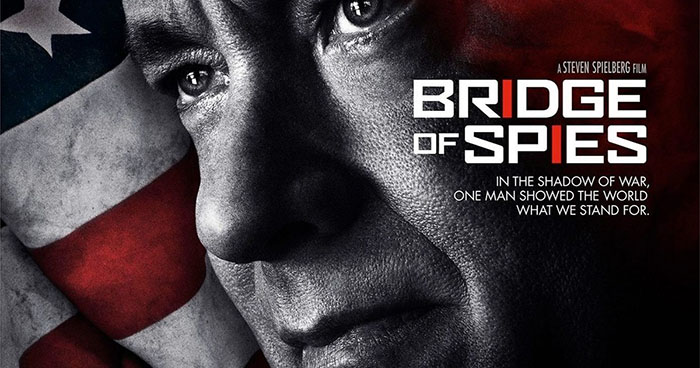
Espionage legal yawner, I mean thriller. A common lawyer practicing insurance law is chosen by the U.S. government to defend a Communist spy during the Cold War. Then he is becomes the negotiator to trade that spy for the American pilot shot down in the U2 plane, Gary Powers.
I tried to watch this film. I really tried. I got half way through and just stopped out of sheer boredom. I think Spielberg must have been trying to make an old 1950s spy movie, complete with long boring shots of people walking to meetings and away from meetings, long drawn out scenes of talkie talking, and negotiations that are supposed to be interesting but aren’t. How they used to edit back in the 50s. It was 30 minutes too loooooong.
An Oscar nomination for best picture? What were they thinking?
And then I realized why it was. Modern Hollywood has a love affair with depicting Communist artists as victims, so they LOVE to award that sycophancy.
You can see Spielberg building a case for “due process” by trying to show that even Communist spies deserve a defense. Fair enough. But it’s always Communists. Let’s protect Communists, they’re really just a Boogeyman of the Right, anyway, right? I can’t wait to see a movie where they defend the right of Christian bakers and wedding photographers to due process. Oh, wait, that’s the real danger in America, Christian do gooders, not murderous Communists and Islamists. THEY don’t deserve due process.
I won’t be holding my breath for THAT movie.
And then he depicts all the Americans as wanting to skirt law because of their hard heartedness toward that poor little old Communist man who likes to paint pictures. He’s so sweet and gentle. Oh, he’s an artist too! The persecuted artists in the dark underbelly of 1950s America! While the heroic Everyman, named Donovan, played by heroic Everyman actor Tom Hanks (Although I can’t say I see him that way anymore) blunders his way through a world of “American Red Scare paranoia.” His neighbors become paranoid of him for defending a Commie. His son comes home paranoid, preparing for an atomic blast at home. All the terrible Paranoia! This is supposed to appear to be absurd to our modern eyes since we know it never happened. But the real truth is that it WAS a possibility and within their context, it was not outrageous or paranoid. The fact that it didn’t happen does NOT mean it could never have happened. It was a real possibility.
Communist denial in Hollywood is pandemic. I don’t think I have the stomach to watch Trumbo and the hero they will no doubt make out of that Communist traitor to America. Because after all, he was a poor little old Communist Artist.
This is just more of the moral equivalency of Spielberg that we got with Munich, where the Israelis were portrayed as morally equivalent terrorists for exacting justice on Palestinian terrorists.
But I sat back down and suffered through the rest of Bridge of Spies, because of my patriotic duty.
And though it was still boring, there were a few qualifying elements that countered the moral equivalency of the story. I must be fair, since I’m not a Hollywood Communist artist. First, there is an eerie moment near the end where Hanks is riding a train in East Berlin (The Communist side). He sees a group of people running to the Berlin Wall and trying to climb over to the West Side to freedom. He sees them all get shot by East Berlin guards. Then at the very end, when Donovan is home in America, he’s riding a train again. This time he sees a bunch of kids running to a fence and climbing it in their backyard. A brilliant counter image of freedom versus the captivity of Communism. So there IS a difference between the two worlds. They are not ultimately equivalent. I wonder if that was the Coen Brothers’ writing leaking through.
On the other hand, the U.S. government is portrayed as not caring about its own citizens. Donovan uncovers the opportunity to add another hostage to the negotiations, a stupid American student studying Marxist economics in Berlin. The US government guy handling the deal tells Donovan about 20 times that they don’t care about the student, just the pilot, forget the student, we don’t want him, leave him there, it’s his problem, we don’t care about American citizens, only our pilot, forget about him (we get the point, Steven). The irony is that the government guy was right. An American soldier POW is NOT the equivalent representative of the United States as a stupid American who deliberately hides out in enemy territory during war. Sorry, they ain’t the same.
On the other hand, the treatment of the American prisoner Gary Powers in Cuba was not portrayed as equivalent to the treatment of the Russian spy in America. Spielberg did show Powers being manhandled for information (child’s play compared to today), while the Russian was questioned humanely in America.
Okay, so I’ll grant it’s a somewhat nuanced moral equivalency.
And there is the fact that Donovan went on to negotiate the release of 9000 captives from Castro’s Cuba. So it was amazing that this average American guy got caught up in changing the world for the better.
Spielberg has made a legacy of brilliant storytelling by focusing on the ordinary common man who becomes a hero, and this is no exception. I can’t fault him for that.
But I can fault him for boredom.
If you want to see the reality of Communist spies in America during the Cold War, I highly recommend watching the Series, The Americans. It’s fantastic. it’s truthful.
And it’s not boring, I promise.

